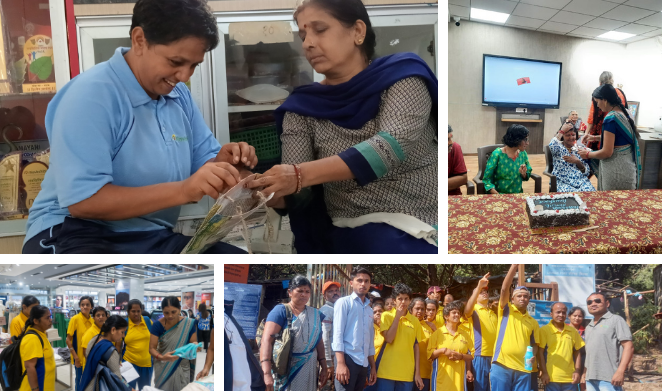
Navkshitij has developed a model of parenting care for individuals with intellectual disabilities. The big strides made by the organization are a testament to the success of the model.
Family-Based Care
The parenting care model for individuals with intellectual disabilities at Navkshitij emerges as a pioneering solution to a longstanding issue in care facilities. While it’s common for individuals without disabilities to reside in hostels temporarily for educational pursuits, the idea of those with intellectual disabilities spending their entire lives in an institutional setting seems difficult to understand or accept.
Recognising this disparity, Navkshitij devised a groundbreaking parenting care model that prioritises familial bonds and community integration vis-à-vis the traditional practices at a regular hostel or institution. This innovative approach not only fosters a sense of belonging and stability but also ensures that the residents experience a fulfilling and supportive environment akin to living with family members.
The model addresses the need for a more humane and inclusive approach to long-term care for individuals with intellectual disabilities and thus stands as a beacon of progress in the field of caring for people with special needs.
Key Features of Navkshitij’s Parenting Care Model
- Living Together Happily: Staff members, a resident trustee, and resident special friends all live together on the campus. This fosters a sense of community living and togetherness, with happiness being the natural byproduct. This arrangement creates a supportive environment where everyone is treated like family, similar to assisted living for adults with disabilities.
- Celebrating Together: Navkshitij celebrates various festivals together, encouraging full participation from all residents and staff members. This inclusive approach reinforces the sense of belonging and ensures cultural integration, akin to day programs for adults with disabilities.
- Bonding and Attachment: The residents form a strong bond with the staff members and each other, often preferring to stay at Navkshitij even when they have the option of visiting their families. This says enough about the success of the model in creating a supportive, joyful, and fulfilling environment, highlighting the importance of living skills for adults.
- Smooth Adjustment: Despite initial concerns from parents, residents quickly adjust to life at Navkshitij, enjoying their time with peers and participating in various activities. This smooth transition is crucial for programs for persons with disabilities.
- Behaviour Management: The model focuses on addressing behavioural issues through therapy-like interventions. For instance, instead of reacting loudly to problematic behaviours, the staff members provide emotional support and proper training, leading to a reduction in behavioural problems over time. This is particularly beneficial for those with mental illness and disability.
Additional Support Programs
Navkshitij also offers free programs for disabled adults, helping them develop essential skills and find work from home for people with disabilities. By providing comprehensive support, Navkshitij ensures that both residents and caregivers for special needs have the resources and training needed for success.
Be A Part Of Our Spread Happiness Movement Bringing Happiness:
Lighting Up The Lives Of Special Friends
Donate- Your contribution directly supports our programs and services, ensuring that persons with intellectual disabilities (PwIDs) receive the care and support they deserve.
Register- Join our community as a volunteer or supporter to stay updated on our initiatives and opportunities for involvement.
Spread The Word- Share our mission with others to raise awareness and advocate for the rights of PwIDs, amplifying the impact of our work. Join Our Community #BringingHappiness #LifeatNavkshitij #LightingThePath
